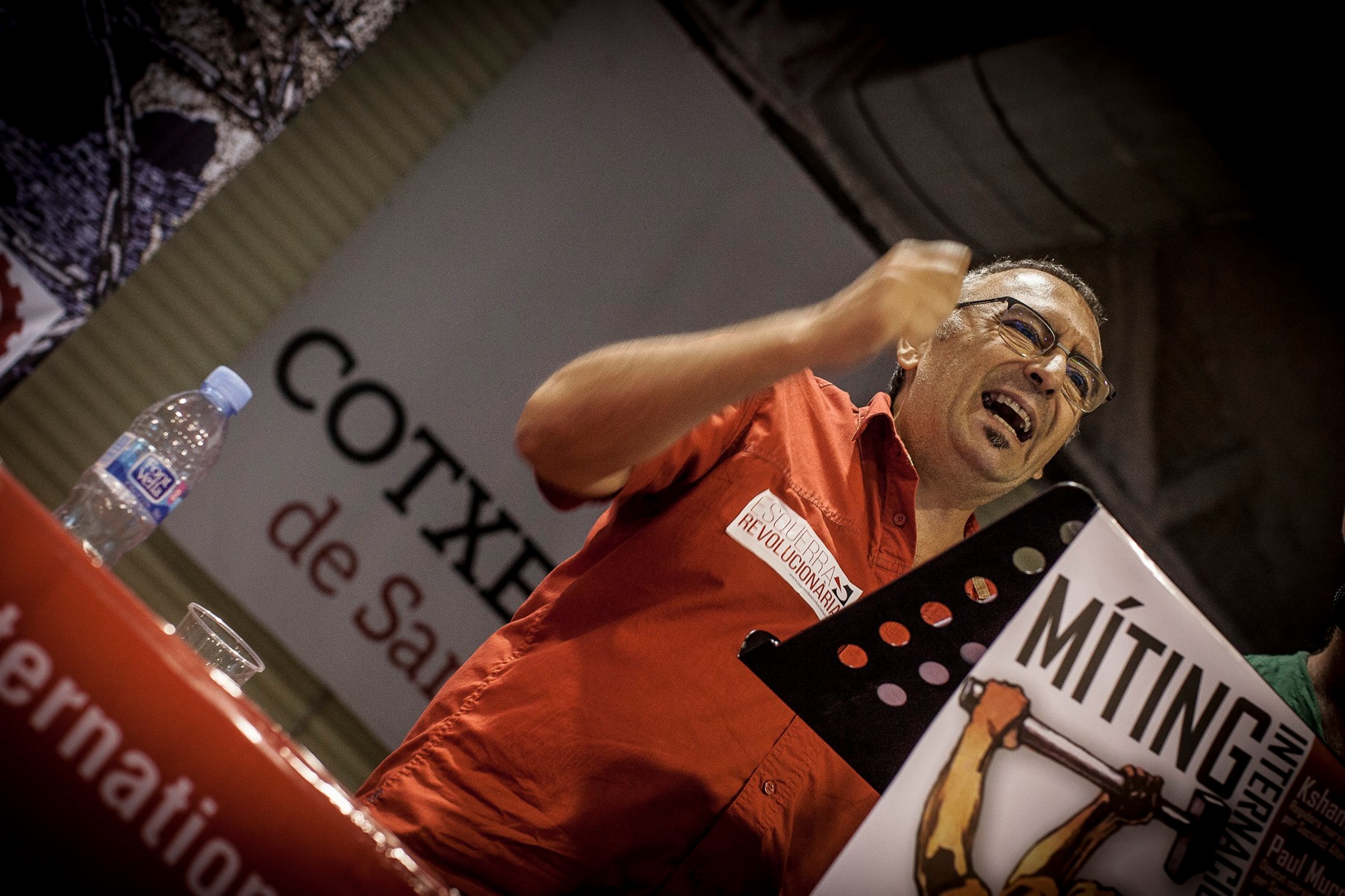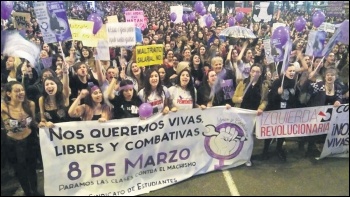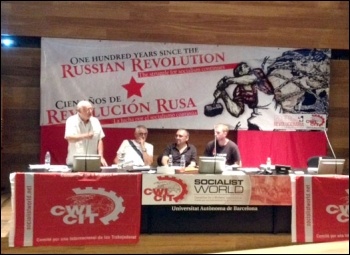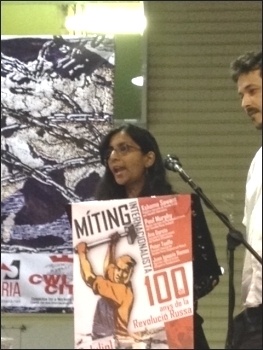Building workers’ struggle and the forces of international socialism
The Committee for a Workers’ International (CWI – the socialist international organisation to which the Socialist Party is affiliated) recently convened its international summer school in Barcelona with Izquierda Revolucionaria (IR) and members from its sections in Spain, Mexico and Venezuela.
A special congress of delegates during the school confirmed the unification between the two international socialist organisations. Below, the Socialist carries an extract of the document agreeing this historic merger.
A high point of the week-long event was the 600-strong rally celebrating the 100th anniversary of the Russian Revolution, where leading representatives of the CWI and IR spoke. A rally report is also carried here.
Additional debates and discussions from the school will be posted on socialistworld.net
Why the CWI and IR are unifying
This historic unification has a clear material basis in the profound change in the class struggle internationally opened up by the world capitalist crisis which began in 2008 and which still rages today.
Such periods of sharp change and turmoil are invariably also reflected in developments in the workers’ movement and the left, including the revolutionary left – resulting in splits, realignments and fusions – as ideas, organisations and tendencies are put to the test.
It is our common understanding of, and response to this new period and agreement on the method of how to intervene in it and the central tasks it poses for the working class and Marxism, which is the basis for our unification.
The capitalist crisis is deep and intractable. None of the attempts of the world’s ruling classes to deal with it have brought a solution any closer or re-established the system’s lost equilibrium. On the contrary, they have stored up the potential for new crises and conflicts.
The world economic crisis of over-production, characterised by a crisis of investment and chronic lack of demand in the world economy, is no closer to being resolved than at the moment of its outbreak.
The trillions of dollars injected into the world economy in the form of ‘quantitative easing’ have not had anywhere near the desired results, in resuscitating either investment or demand.
Maelstrom
Far from representing a new motor for world growth as hoped for by many capitalist commentators, the last phase of the crisis has seen the so-called ’emerging’ economies – with China at the head – drawn into the maelstrom of the world crisis.
The global strike of capital investment paints a clear picture of the obstacle which private ownership of wealth and means of production, together with the nation state, represents for the development of the world economy.
The crisis has already resulted in profound changes in the moods and outlook of all classes, most significantly among the working class, young and oppressed peoples around the world.
Marxists predicted at the onset of the crisis that it would usher in a period of revolution and counter-revolution, and this has been the tenor of events since then. From the revolutionary upheavals of the “Arab Spring” in 2011, to mass movements against austerity and the current social rebellion against Trumpism in the USA’s urban centres, the period has been marked by the increasing entry of the masses onto the scene of history.
This has been accompanied by a polarisation in society with a shift to the left in political consciousness and also, as a result of the bankruptcy of reformism and the traditional bourgeois parties, an electoral growth of the far right.
The development of new left parties and formations, like Podemos in Spain, France Insoumise (led by Jean Luc Melenchon) etc, together with the mass left movements around Bernie Sanders and Jeremy Corbyn, are powerful – though complex and unfinished – expressions of this.
These new left formations and movements are contradictory and volatile, reflecting the nature of the period which has given birth to them.
Our role is to intervene energetically in these processes, while at the same time audaciously and openly defending a socialist, class-struggle based programme.
While building our own revolutionary organisation, we work to assist the development of these formations into new mass parties of the working class armed with a revolutionary alternative to capitalism.
A new era of opportunities for revolutionary change has opened up. CWI sections in the USA and Ireland have already played leading roles in mass working class movements which have won important victories (water charges in Ireland and $15 Now in US). The members of Izquierda Revolucionaria, in the leadership of the Sindicato de Estudiantes (students union – SE) waged a victorious battle against the “revalidas” (education counter-reforms) in the Spanish state which has consolidated the SE as a fighting point of reference in the struggle against austerity.
Victories
These victories show our ability to engage with the masses and, in certain circumstances, to become a real factor in the situation, which sets our organisations apart from other Marxist organisations.
Our unification is rooted in a broad agreement on the perspectives for world capitalism and the tasks which arise for Marxists. However, it is reflected in much more than this.
Our mutual experience of discussing and fighting side-by-side has revealed an agreement not only in ideas and perspectives, but in strategy, tactics, programme and orientation. As Lenin said, without revolutionary ideas there is no revolutionary movement. But equally, ideas and theory without practice are blind.
Our revolutionary international and sections have a clear orientation to intervene in the mass struggles, trade union and political organisations of the working class. We also maintain the principle of the political and organisational independence of the revolutionary party.
Flexibility in tactics, coupled with principled political and programmatic firmness, is a hallmark of our shared political roots and method.
We fight to occupy the front line in the struggle against all forms of oppression, uniting the working class and all the oppressed around a perspective of socialist change.
The CWI, together with our new comrades in IR, is an international Marxist force with a real base among workers and youth in a number of key countries.
Barcelona rally: Celebrating 100th anniversary of the Russian revolution
Izquierda Revolucionaria
The international rally on 19 July organised by IR and the CWI was a huge success. More than 600 workers, youth and activists from both organisations and the wider left packed the main hall of the Cocheras de Sants, Barcelona. There was an electric atmosphere, in defence of the October 1917 revolution and Marxist internationalism.
Speakers were: Ana Garcia the general secretary of the Sindicato de Estudiantes (SE – students union), Paul Murphy, Solidarity TD (MP) in the Irish Republic; Juan Ignacio Ramos general secretary of Izquierda Revolucionaria; Peter Taaffe, general secretary of the Socialist Party and Kshama Sawant, Socialist Alternative councillor in Seattle, USA.
In two hours they covered a broad scope of issues from the October revolution to the class struggle today. All of the speakers emphasised the extraordinary legacy of Bolshevism, the ideas of Lenin and Trotsky and their relevance in the fight for a socialist world today.
The banner of the October revolution is for us a guide to action. When the workers and youth of Russia took power they showed in deeds and not only in speeches that it really is possible to change reality and bring down capitalism.
There were also references to the collapse of the USSR and the Stalinist regimes in eastern Europe, which gave way to a vicious capitalist counterrevolution.
At that time, capitalists internationally cried victory and the leaderships of the traditional left organisations, the old communist parties and social democracy, as well as the trade unions, turned sharply to the right and accepted the creed of neoliberalism.
But in the middle of the storm of reaction and of abandonment of struggle, Marxists resisted. We knew that the apparent triumph of capitalism would be temporary and that a new crisis would dispel all illusions
Capitalism
All speakers underlined how, starting ten years ago, world capitalism is living through its worst recession since 1929.
Conditions determine consciousness, as Karl Marx said. The crisis accelerated all the processes of the class struggle and led to an upturn in struggle.
The consciousness of millions of workers and especially youth has advanced, together with social polarisation. Capitalism has been thrown into a period of uncertainty and pessimism.
But the experience of these years has also shown that if we want real change, rhetoric and speeches are not enough.
The example of Greece is conclusive. Left party Syriza and its leader Tsipras had the backing of the working people. But Tsipras lacked a revolutionary policy, accepted the logic of the capitalist system and capitulated shamelessly to the ‘Troika’ (group of capitalists), applying its austerity.
Kshama Sawant explained the work of Socialist Alternative in Seattle – the successful campaign for $15 an hour, and the big mobilisations built, together with others, against Trump’s reactionary policies.
Kshama explained how to use an elected position to raise the level of organisation and consciousness. The same applies to Paul Murphy in the struggle against water charges – which provoked a brutal response by the state.
However, the Socialist Party (CWI in Ireland) organised with others a mass campaign against the criminalisation of protest, which managed to defeat this attack and achieve a ‘not guilty’ verdict for all defendants in the biggest political trial for a generation.
Peter Taaffe explained the main ideas of Bolshevism, underlining the importance of the existence of a revolutionary party to transform society completely. This is the central task of the epoch: building revolutionary parties all over the world, through patient intervention in the class struggle and in the new political phenomena which arise as a consequence of the crisis of the system and of social democracy.
Ana Garcia focussed on the key role of young people in all the events we have seen in Spain. The children of the crisis see that this system has nothing to offer them. They have been the spinal column of the social rebellion which has held the minority Popular Party government in check.
School strikes
Ana explained how the Sindicato de Estudiantes has played a leading role in this battle with 25 general strikes in schools and universities against the government which is the inheritor of Francoism.
Millions of youth want a deep and radical change but this change cannot be achieved by respecting the logic of capitalism. This is why the SE defends the ideas of Marxism and Bolshevism.
Borja Latorre and Juan Ignacio Ramos both spoke in defence of the right of self-determination in Catalonia. For IR, the Catalan people have the right to decide, and this should not be conditional on the state accepting it. This right must be won by mobilisation and mass struggle.
We cannot subordinate ourselves to the Catalan bourgeoisie, right-wing nationalists like PDeCat, who are champions of cuts and repression. We fight for a socialist Catalonia, a socialist republic, to unite the forces of the workers and youth of Catalonia with those of the rest of the Spanish state, to win real democracy which can only be socialism.
The rally finished with an emotional singing of the Internationale in various languages by more than 600 people, ending a deeply red and internationalist event.












